Marathi literature is the body of literature of Marathi, an Indo-Aryan language spoken mainly in the Indian state of Maharashtra and written in the Devanagari and Modi script.
Vishnu Puran is an Indian television series, by B. R. Chopra on the Hindu deity Vishnu. It is based on the Bhagavata Purana. Bhagavata Purana tells about the 10 incarnations of Vishnu, as well as other stories, such as the legend of Dhruva. The weekly series first aired Sunday morning, 23 January 2000 on Zee TV. The 124 episodes were later released on DD National.
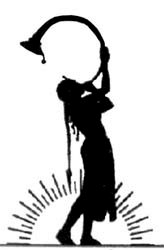
Prabhat Film Company was an Indian film production company and film studios founded in 1929 by the noted film director V.Shantaram and his friends.
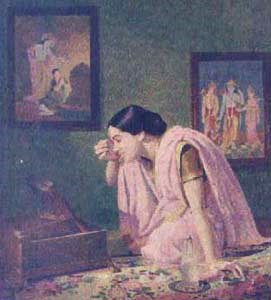
Kunku is a 1937 Marathi classic social drama film directed by V. Shantaram, and based on the novel, Na Patnari Goshta by Narayan Hari Apte, who also wrote film's screenplay. The film was simultaneously shot and released in Hindi as Duniya Na Maane.
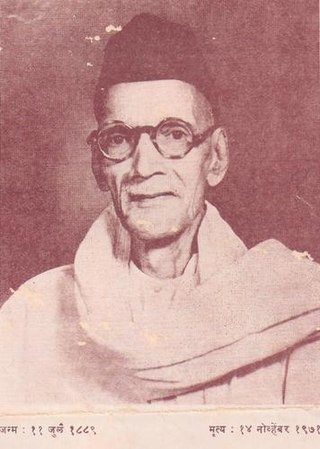
Narayan Hari Apte, popularly known as Nanasaheb Apte was a Marathi popular novelist, writer of advice books and editor from Maharashtra, India.
Ramchandra Purushottam Marathe, also known as Pandit Ram Marathe, was a Marathi music director, singer, and actor on stage and in films. As a child actor, he performed the title role of Krishna in Prabhat Film Company's 1938 film, Gopal Krishna. He was disciple of Vilayat Hussain Khan, the maestro of Agra gharana of Hindustani classical music., Master Krishnarao Phulambrikar and others. Through Master krishnarao, he developed his Khayal style which had elements of different gharanas such as Jaipur, Gwalior and Agra.
Vishnupant Govind Damle was an Indian production designer, cinematographer, film director and sound engineer for Marathi films. His 1937 film Sant Tukaram was the first Indian film to be screened at an international film festival. It won a "Special Recommendation" at the 5th Venice International Film Festival.
Vinay Apte was an Indian film and television actor. He acted in several Marathi movies and television shows in his almost 40-year-old career. He has also acted in Hindi movies such as Chandni Bar, Ek Chalis Ki Last Local, It's Breaking News, Satyagraha and Rajneeti.
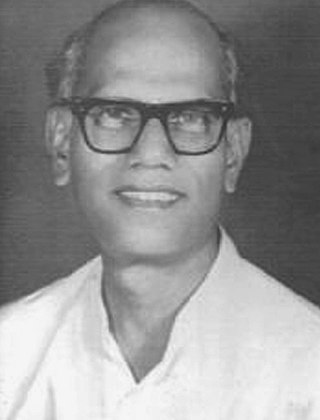
Shantaram Govind Athavale was an Indian director of Marathi, Hindi and English language films, a lyricist, poet, and author. Part of the generation that emerged from the Prabhat Film Company in Pune in the 1930s, he made pioneering contributions to Marathi film.
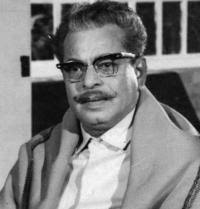
Gajanan Jagirdar was a veteran Indian film director, screenwriter and actor. He worked in Hindi Cinema, also called Bollywood, as well as Marathi cinema. The period of 1942 to 1947, saw his rise as a film director with Prabhat Films.

Amrit Manthan is a 1934 Indian costume-drama film directed by V. Shantaram for his Prabhat Film Company. The film was produced simultaneously in Hindi and Marathi. The film starred Chandra Mohan, Nalini Tarkhad, Shanta Apte, G. R. Mane, Varde and Kelkar. The film was based on Narayan Hari Apte's novel Bhagyashree. The Hindi translation was done by Veer Mohammed Puri, who also wrote the lyrics for the film.
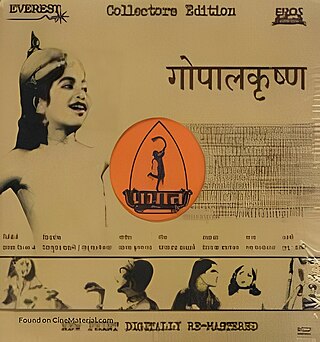
Gopal Krishna is an Indian religious silent film made in 1929. It was directed by V. Shantaram for his newly formed Prabhat Film Company. The film was a "solo debut" for Shantaram, after co-directing Netaji Palkar (1927) with K. Dhaiber for the Maharashtra Film Company. The story was written by Shivram Vashikar and the cast composed of Suresh, Kamaladevi, Anant Apte, Sakribai and G.R. Mane.

Amar Jyoti is a 1936 Hindi social, action adventure, drama film directed by V. Shantaram. Produced by Prabhat Film Company and cited as a "noteworthy" film along with Shantaram's earlier Amrit Manthan (1934), the film had actress Durga Khote performing one of her most "memorable" roles. K. Narayan Kale wrote the story with dialogues by Narottam Vyas. The music was composed by Master Krishnarao. The director of photography was V. Avadhoot, and the cast included Durga Khote, Chandra Mohan, Shanta Apte, Nandrekar, Vasanti and Narayan Kale.
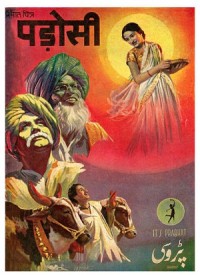
Shejari is also known as Padosi in Hindi version as. Padosi is a 1941 Indian social drama film directed by V. Shantaram. It was produced by Prabhat Film Company and the bilingual film in Marathi and Hindi was the last film Shantaram made for Prabhat before venturing to form his Rajkamal Kalamandir. The film is cited as one of the three social classics Shantaram made at Prabhat. The other two were Duniya Na Mane (1937) and Aadmi (1939). The story and dialogue were by Vishram Bedekar in the Marathi version, while the dialogues in the Hindi version were by Pandit Sudarshan, who also wrote the lyrics. The music director was Master Krishnarao. The famous character artist Radhakrishan made his acting debut in the film as a villain. The film starred Mazhar Khan, Gajanan Jagirdar, Anees Khatoon, Radha Kishan, Lajwanti, Sumitra, Gopal and Balak Ram.
Rani Saheba also called Bazarbattu is a 1930 Indian silent film. It is cited as the first children's film made in India. The film was co-directed by V. Shantaram and Keshavrao Dhaiber. The cinematographers were S. Fattelal and Vishnupant Govind Damle and the cast included Keshavrao Dhaiber, Baburao Pendharkar, V. Shantaram and Anant Apte.

Manoos, also called Life's for Living, is a 1939 Indian Marathi social melodrama film directed by V. Shantaram. The movie was simultaneously made in Hindi as Aadmi. The film was based on a short story called "The Police Constable". The story was by A. Bhaskarrao, with screenplay and dialogue by Anant Kanekar. The cinematographer was V. Avadhoot and the music was composed by Master Krishna Rao, with lyrics by Kanekar. The cast included Shahu Modak, Shanta Hublikar, Sundara Bai, Ram Marathe, Narmada, Ganpatrao and Raja Paranjpe.
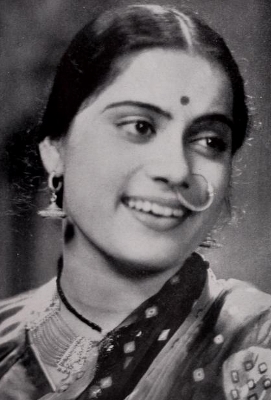
Shanta Apte (1916–1964) was an Indian actress-singer who worked in Marathi and Hindi cinema. Renowned for her roles in films like Duniya Na Mane/Kunku (1937) and Amar Jyoti (1936) under the Prabhat Films banner, she was active in Indian cinema from 1932 to 1958. Apte's impact on Marathi cinema "paralleled" that of Kanan Devi in Bengali cinema. Along with Kanan Devi, Apte is cited as one of the "great singing stars" from before the playback singing era. Apte began her career in films playing the role of a young Radha in the Marathi film Shyamsunder (1932). She joined Prabhat Films acting in her first Hindi language film Amrit Manthan in (1934).

Krishnaji Ganesh Phulambrikar (1898–1974), popularly known as Master Krishnarao, was a musical genius - an Indian vocalist, classical musician and composer of Hindustani music. He was credited with the creation of three Hindustani ragas and several bandishes. Phulambrikar, a recipient of the Sangeet Natak Akademi Fellowship, was also the music composer of several movies, including Dharmatma, a 1935 Hindi film starring Bal Gandharva, a renowned Marathi singer and Padosi, a 1941 directorial venture of V. Shantaram. The Government of India awarded him the third highest civilian honour of the Padma Bhushan, in 1971, for his contributions to music.

Shanta Hublikar, was an actress and singer from early years of Indian cinema. Shanta worked in Marathi, Hindi and Kannada films from 1934 to 1963. Her songs Ab kis liye kalki baat from Aadmi and its Marathi version Kashala udyachi baat from Manoos became immensely popular and established her as a star actress of her time.













